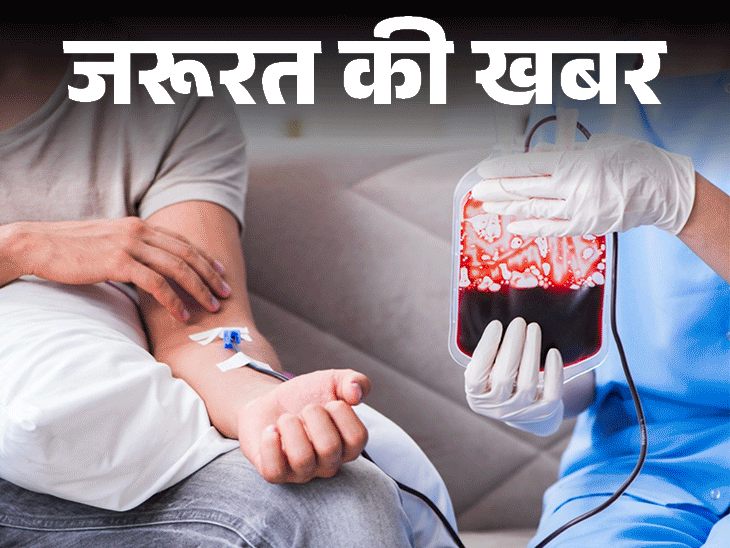Condition just in A 34-year-old woman died due to doctor’s negligence at a government hospital in Andhra Pradesh’s Kakinada district. In reality, the woman suffered from kidney disease for which she needed blood.
An in-house surgeon on duty mistakenly started transfusing “AB positive” blood into the woman instead of “O positive”, due to which her condition deteriorated and she died.
Generally, 4 types of blood groups (A, B, AB and O) are found throughout the world. These are divided into positive and negative subcategories.
If a person needs blood, they can only receive it from certain categories of people. Transfusing blood of the wrong blood type can lead to serious health problems. In some cases, it can also be fatal.
The patient and his family should therefore ask their doctor a few questions before any blood transfusion.
So, today in the needs news we will talk about the important questions that the patient or his family members should ask before receiving a blood transfusion. You will also learn that-
Which donor can give blood to a person of which blood type? Can there be side effects when donating blood?
Expert: Prof. Harendra Yadav, Department of Pathology, SN Medical College, Agra
Ask the doctor these 10 questions before a blood transfusion
If you or any of your family members are scheduled to undergo surgery during or after which a blood transfusion may be necessary, you should ask your doctor some important questions beforehand so that you can prepare mentally.
Question 1: Do I really need a blood transfusion?
Answer: When you ask your doctor if I really need a blood transfusion, he will tell you that it is possible. If there is a lot of blood loss during the operation, you will definitely need a blood transfusion. If this does not happen, blood may not be necessary.
Overall, the doctor will explain to you all the reasons why a blood transfusion may be necessary and under what circumstances. How much blood may be needed? What preparation should you do in advance for this? For example, doctors may ask you to visit a blood bank or your relatives to obtain blood.
Question 2: For which blood type will I receive a blood transfusion?
Answer: Blood can always be collected only from the prescribed blood type. The patient or their family can ask their doctor which blood type will be transfused. So, in case of emergency, immediate arrangements can be made to obtain blood.
Understand from the graph below that people of which blood group can take blood from whom.
Question 3: How many units of blood will I receive?
Answer- The number of units of blood that will be transfused into a patient depends on their weight, age or the amount of blood lost from the body. Therefore, before blood transfusion, the patient should ask the doctor how many units of blood can be transfused.
Question 4: If an infection occurs due to a transfusion of infected blood, what precautions will be taken to prevent it?
Answer – The patient should be aware of the side effects that may occur during or after a blood transfusion. He or she may ask the doctor what medications will be given to control whether an allergic reaction or infection occurs after the new blood enters the body.
Question 5: What tests should be performed for a blood donor?
Answer: Before donating blood, the patient should know what tests are carried out on the blood donor.
Before donating blood, some mandatory tests are carried out for each person, understand it from the graph below:
Question 6: Can there be side effects after a blood transfusion?
Answer-Prof. Harendra Yadav explains that there are usually no side effects during or after a blood transfusion because the blood is transfused to the patient only after several tests. However, some patients may experience symptoms like a cold or an allergic reaction. The patient must be aware of this.
Question-7: What precautions will be taken during a blood transfusion?
Answer- It is very important to be careful while giving blood transfusion. Therefore, the patient should ask who will be assigned to monitor them. What will be the speed of blood flow during a blood transfusion? If a blood transfusion causes a side effect, how will its symptoms be identified?
Question-8: How will the patient be taken care of after a blood transfusion?
Answer – After a blood transfusion, the doctor may advise you to get enough rest, not lift weights or do strenuous exercise. The doctor may also advise having regular monitoring tests over several days. This way, if a side effect occurs, it can be identified immediately.
Question 9: What can I eat and drink after a blood transfusion?
Answer: The patient can ask the doctor about their eating and drinking habits before the blood transfusion. After a blood transfusion, the doctor may change the patient’s diet based on their current condition. Doctors may advise refraining from eating certain things.
Question 10: Can I know how old the blood transfused by the blood bank is?
Answer: Yes, absolutely! If blood from a blood bank is transfused, the patient should be asked how old the blood is. There are two types of blood bags to store blood. The expiration date or lifespan of the blood is written separately. ,
Many drugs failed the quality test during the investigation by drug regulator CDSCO (Central Drugs Standard Control Organisation). This means that a medicine is not effective against the disease it is intended to treat. …

